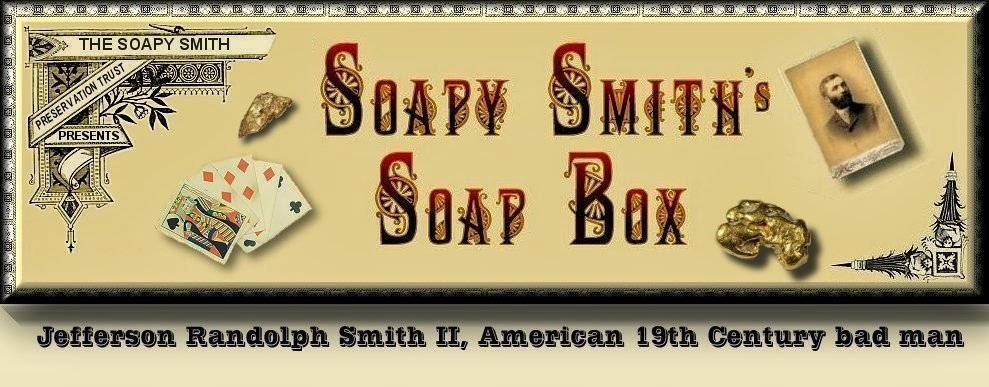(Click image to enlarge)
Jeff Smith as "Soapy"
I received the October issue of Journal, the bi-monthly magazine of the Wild West History Association. In it is a nice review of my book, Alias Soapy Smith, by Mark Boardman. Here it is in its entirety.
Alias Soapy Smith: The Life and Death of a Scoundrel. The Biography of Jefferson Randolph Smith II, by Jeff Smith, Klondike Research 2009, 628 pp. including illustrations, bibliography, footnotes, index, hardcover $43, softcover $26.
There are innumerable ways a person can “con” somebody else—and Jefferson Randolph “Soapy” Smith II apparently found and used most of them in his 37 years on earth. Soapy would try just about anything that would separate folks from their money or land or other valuables, or would further enhance the power and prestige of the man himself.
The shell game. Card tricks and rigged gambling enterprises. Land scams. A well-preserved corpse that Soapy claimed (lied) was the petrified remains of one of John Fremont’s soldiers—and could be viewed for a price. And of course, the soap game that gave the man his legendary nickname, in which he sold bars of soap, some of which he said included money inside the wrappings.
But as Jeff Smith shows in this tome on his great-great-grandfather, it’s way too simple to label this very complicated man as a mere con artist.
Soapy led his criminal organization (appropriately called the Soap Gang) into numerous enterprises, both legal and illegal, in towns including Denver and Cripple Creek and Creede and Skagway. He tried to grab power in Mexico (a scam that didn’t pan out). He left a major historical footprint at each stop by buying elections, bribing office holders and law enforcement, contributing to development efforts and more. And he swindled a lot of people out of a lot of cash.
And along the way, Smith ran into some notable characters including Wyatt Earp, Bat Masterson, Vendetta Rider Texas Jack Vermillion, and the “dirty little coward” who killed Jesse James, Bob Ford (whom Soapy hated). Smith was even in Round Rock, TX in 1876 when robber Sam Bass got his comeuppance.
Yet Soapy (who could be quite violent when such was called for) was a dedicated family man who kept his family in St. Louis, away from the tumult he helped to create. He frequently gave money to the poor and dispossessed—sometimes doing so quietly and with no public fanfare. He was loyal to his friends to a fault. Smith was extremely intelligent and had a knack for planning and organization, albeit for the wrong side of the law.
Yep, Soapy Smith was a very complicated man.
So his descendant Jeff Smith took on a big task when preparing and writing this autobiography. It took more than 25 years of work, but the author had access to documents, photographs, and even newspaper clippings collected by Soapy himself. The result is easily the most comprehensive and accurate look at the king of the cons. And to his credit, Jeff Smith is very evenhanded in his treatment of family. He doesn’t try to whitewash or absolve Soapy of his bad deeds, but still points out the man’s good points. As a result, the reader is presented with a real flesh and blood person.
And Jeff Smith has come up with some important finds—especially regarding Soapy’s death on an Alaskan wharf in the summer of 1898. Tradition holds that a drunken Soapy and vigilante Frank Reid killed each other in a shootout. Some say that lawman J.M. Tanner, who was present, was the one who fired the fatal bullet. Jeff Smith makes a strong case that a third man (we won’t reveal his identity here) was the shooter, gunning down an unarmed Soapy who was asking for mercy.
On the other hand, the manuscript needed an editor. There are some spelling and grammatical problems. And one finds some glaring historical issues—like referring to the brother of Jesse James as Alexander (sure, that was his real first name…but everyone called him Frank). But the real problem is the size and intricacy of the narrative. Seemingly every con Soapy ever pulled is detailed, and after awhile events tend to blend into one another. And they go on and on and on. The book becomes a tougher read than it need be. And that limits the audience to die-hard historians who are looking for the minute specifics.
And that’s a shame, because this is an important story, one that should reach a broader market. Soapy Smith was a remarkable character who deserves to be better known. Jeff Smith is to be commended for telling his story. If only it had been a bit more concise…
I emailed Mark my thanks, along with a few explanations regarding his concerns about the book. Mark emailed me back the following.
Jeff--Thanks for your kind comments and explanations. I hope you know that I admire your work on this book. In particular, it sets the historical record straight on Soapy, and that is an invaluable contribution to the field.
All best,
Mark
THANK YOU MARK!
.




No comments:
Post a Comment
Thank you for leaving your comment and/or question on my blog. I always read, and will answer all questions asap. Please know that they are greatly appreciated. -Jeff Smith